The Haunted Deluna House
Reading Time: 10 min
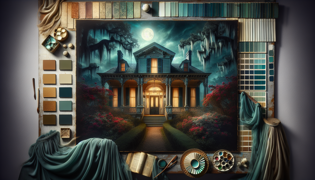
About Story: The Haunted Deluna House is a Legend from united-states set in the Contemporary. This Dramatic tale explores themes of Courage and is suitable for Adults. It offers Entertaining insights. A spectral legacy stirs in the moonlit halls of Pensacola’s oldest abode.
Introduction
The Deluna House stands on Alcaniz Street like a forlorn mariner stranded by time. Its shutters hang crooked, as if listening to the wind’s secrets. Locals speak of ghostly gatherings in its grand salon, where chandeliers once sparkled like constellations over dances long vanished. Even on sweltering Pensacola nights, a cold draft seeps through cracks in the ancient siding, carrying hints of decayed magnolia blossoms and damp wood. A faint hum creeps from the attic, more mournful than any nightjar’s call, and every floorboard groans under the weight of unseen footsteps.
Four strangers assemble beneath the house’s creaking portico, torches bobbing in anxious hands. Clara, an architectural historian, carries measured faith in facts and ledger entries. Jonas, a sceptic reporter, crunches notes with a pen that tap-dances across his pad. Mae, a local storyteller, swears she’s heard her grandmother’s voice among the echoes. And Old Ben, a retired sailor, mutters ‘‘blow me down’’ whenever the lantern flame quivers unbidden.
The door resists their push, peeling paint rasping like fingernails along a chalkboard. Inside, wallpaper peels in lacy strips, revealing plaster mottled with time’s sepia stains. The air tastes of age—a heady blend of beeswax polish and crumbling mortar. Somewhere above, a soft susurrus stirs, like moth wings brushing against a lantern globe. They exchange glances, hearts ticking like pocket watches. Tread lightly, for even courage quails when the night speaks in voices of the departed.
A sudden gust rattles a row of windows, setting the curtains to flapping like phantom sails. Jonas takes a breath, the smell of smoke and jasmine tickling his nostrils. ‘‘We reckon this is just old wind,’’ he says, though his voice trembles. Clara steps forward, tracing a cracked cornice with fingertips cool as marble. Somewhere beyond the door, history shifts, and the ghosts of Deluna House prepare to welcome unwelcome guests. (Sensory detail: the crackle of distant cicadas hums underfoot.)
1. The Legacy of Deluna House
Built in 1835 by the Spanish merchant Pedro Maria Deluna, the house once bustled with candlelit soirées and the laughter of visiting dignitaries. Its oyster-shell columns gleamed bright as ivory keys beneath chandelier glow, and the wide veranda overlooked a garden where magnolias leaned in to whisper sweet nothings. Yet every grand tale hides a shadow, and so it was when Deluna’s fortunes sank like a lead anchor. The family vanished in a single night, leaving behind silver cutlery laid out for guests who never came. Since that vanished supper, locals spoke in hushed tones of spectral dinners, phantom guests seated at a long mahogany table, forks suspended in mid-air as if paused mid-bite.
Mae, the storyteller, remembers her grandmother’s words as crisp as autumn leaves: ‘Don’t go near Deluna House after dusk, or you’ll find yourself sipping tea with the dead.’ Even the breeze seemed reluctant to caress its weathered walls, curling away with measured reserve. The smell of damp earth—beneath the oak tree by the back entrance—lingers like a stubborn memory, mixing with the tang of rusting hinges. Patrons of the nearby tavern have claimed to glimpse lace skirts drifting past shuttered windows, and to hear piano keys strike a single, sorrowful note before silence swallows it whole.
Clara leafs through yellowed ledgers recovered from the city archive. Each page bears meticulous script describing daily provisions—loaves of bread, salted ham and barrels of local rum. One entry bears an unsettled scrawl: ‘Guests unaccounted for by dawn.’ The ink smears there as though one might still weep upon the page. Her fingers brush the texture, and for a heartbeat, she senses breath against her wrist—cold, almost clammy. In the corridor beyond, a half-open door exhales a sigh that rattles her spine.
Jonas records every sound on his digital recorder. At first, it picks up only his own breathing and the distant thrum of traffic. Then, faint as mist, a cluster of footfalls crosses the floor above. He rewinds and listens again: each step falls with purpose, deliberate as a soldier’s march on parade ground. When he follows the sound with his beam, the room gleams empty. ‘Reckon I’m chasing shadows,’ he mutters, but even he cannot suppress the quiver in his tone. (Sensory detail: a faint musk of mildew drifts from a heavy curtain.)
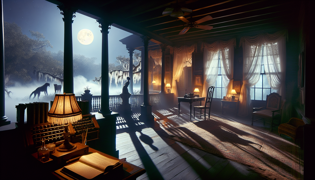
2. Whispers at Dusk
Evening settles over Pensacola Bay like a velvet shawl, and twilight fingers its way through cracked panes. Jonas ventures into the grand salon, where a grand piano stands silent, its ivory keys dulled with dust. He presses a single key, and an echo of melody floats through the gloom, long-since abandoned by living hands. The hush that follows is thick as treacle, pressing against his eardrums. Then, from somewhere deeper, a whisper rises—a sibilant rasp that might be syllables or might be sighs, impossible to tell.
Clara joins him by the hearth, tracing the carved mahogany mantel with fingertips that tremble like novice violin strings. ‘Do you hear that?’ she asks, her voice barely above a hush. In reply, the whisper swells into a gentle susurration, as though unseen lips are uttering her name. She shivers, her skin prickling beneath the wool of her coat. Outside, cicadas begin their night vigil, the buzz like distant machinery grinding slowly to life. She smells faint jasmine again, though no blossom grows within twenty yards.
Mae, armed with a candle, edges along the library alcove. Rows of leather-bound tomes stand sentinel in the gloom, their gilded titles unreadable beneath layers of grime. She lifts a volume—one that bears the hand-tooled crest of the Deluna family—and the spine cracks open with a satisfied sigh. A fragment of paper falls free, fluttering to the rug like a fallen bird. It reads: ‘‘They promised safety to the guest of honour. They did not honour their word.’’ As her fingers close around the note, the candle’s flame quivers violently, casting grotesque shadows that dance upon the walls like distorted marionettes.
Upstairs, Old Ben explores the master bedroom. The four-poster bed lies stripped of linens, leaving only the bare frame—its carved posts gnarled as old oak roots. He runs a palm along the banister rail, and a tremor shudders through him, as though a heartbeat echoes beneath the wood. ‘Land sakes,’ he whispers, ‘this place has more lives than a barn cat.’ He pauses, listening to the distant jangle of chains—soft, rhythmic, and unrelenting. Then, abruptly, the sound stops, replaced by profound silence. (Sensory detail: the velvety hush is pierced by the tang of effervescent salt from the bay breeze.)
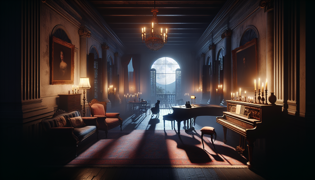
3. The Phantom of the Library
By lamplight, Mae pores over journals left behind by Deluna descendants—their entries raw with fear. One page describes a shape that drifted among the stacks, a figure draped in white, as insubstantial as morning fog. It gasped for words that froze the writer’s pen mid-stroke. Above her, the wallpaper frayed like battle flags, and the bookshelves bowed under unseen pressure.
Clara settles into a high-backed chair, its velvet upholstery threadbare and sticky beneath her coat sleeve. She reads aloud: ‘I saw her by the east window, pale as widow’s veil, staring out with hollow eyes. She beckoned. I dared not follow.’ Her voice falters. Across the room, an open volume snaps its pages shut, reverberating like a gunshot in the night. Old Ben startles, sending his candle toppling—the flicker flares, revealing a smear of something dark upon the rug.
Jonas crouches to examine it—ink, perhaps dried wine, or something more sinister? As he hovers, a bead of wax drips onto his sleeve, leaving a patch stiff as a clam’s shell. He glances upward: between the bookshelf and the ceiling, a pale kneck appears. No more than a sliver of apparition, with hollow sockets for eyes and lips parted in mute lament. It dissolves into shadow before his breath catches.
A low moan courses through the room, the timber floor shaking beneath it. Mae stands, voice unwavering: ‘Every page you turn demands a sacrifice of courage.’ Somewhere in the corridor, the pained squeal of a rocking chair begins, as though someone rocks themselves to sleep—yet no motion shows. The temperature drops so fast that each of them tastes winter’s chill on their tongues. (Sensory detail: the metallic tang of fear prickles their nostrils.)
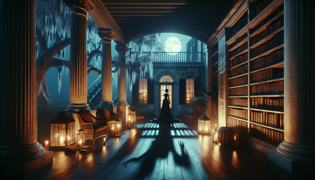
4. Midnight Revelation
At the stroke of midnight, the house seems to draw breath and hold it for a moment. In the foyer, Clara detects the faintest scent of Deluna’s magnolia tea—once served at family gatherings—instead of mould. Jonas records the hush. ’We reckon this is our moment,’ Mae murmurs. ‘Stand firm or flinch now, and they’ll claim you forever.’
They follow a procession of faint footfalls up the staircase, each step groaning like a tired bullock. In the attic, moonlight seeps through a gabled window onto a tapestry of dust motes, swirling like phantom dancers. There, at a small wooden desk, lies a final journal, its leather cover cracked as though it had aged centuries in a single breath. Clara opens it, revealing a last entry scrawled in trembling ink: ‘Forgive us. We bound her here to save our fortunes. Her fury will not abate until justice is served.’
From the rafters descends a figure—sheathed in diaphanous white, hair trailing like spider silk. Her eyes burn with sorrow, her lips parted in eternal lament. The candlelight flickers violently as she stands before them, an apparition as beautiful as a dying star. Jonas drops to his knees, hands raised in appeasement. ‘What justice,’ he whispers, voice thick as treacle, ‘do you demand?’
She extends a pale hand toward the journal, and the pages flutter open to the critical passage. The windows rattle; the floor trembles. Mae steps forward, her voice steady: ‘We promise to unbind you, to tell the truth of your sorrow.’ The ghost inclines her head, as though relieved. A breath of wind surges through the attic, hot as a summer gale, lifting dust from the floorboards. Then, just as suddenly, she vanishes—leaving only a single white jasmine petal drifting down. (Sensory detail: the petal carries the faint perfume of forgotten tears.)
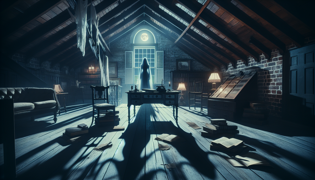
Conclusion
Dawn’s first pale fingers slip beneath the shutters, dispelling shadows like spilled water. In the foyer stands a single jasmine petal on the floor, crisp as parchment, and the stale air tastes of renewal. Clara closes the journal with reverent care, binding its secrets at last beneath her arm. Jonas glimpses a faint smile on Mae’s face—no longer just a teller of tales, but a guardian of truths.
Old Ben props open the front door, and a breeze from Pensacola Bay sweeps through, carrying the salt-laced promise of dawn. The house exhales, shutters clicking softly as though it nods its gratitude. The lingering hush holds no malice now, only a gentle acceptance born of reckoned guilt and restitution. They step into the morning light together, four souls bound by one spectral company, hearts steadied by the courage they found in darkness.
Word spreads of the Deluna House’s quiet transformation. Curiosity gives way to respect, and the old walls cease their restless sighs. Visitors come, not to chase ghosts, but to honour a story brought to light. And on quiet nights, when the magnolias rustle and cicadas grow silent, one might still glimpse a pale figure at the attic window—watchful, at peace, finally free. (Sensory detail: the gentle warmth of sunlight on old wood banishes every shiver of doubt.)

















